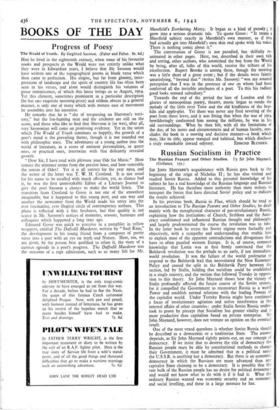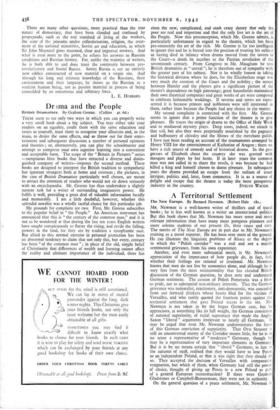Russian Socialism in Practice
The Russian Peasant and Other Studies. Ey Sir John Maynard. (Gollancz. 15s.)
SIR JOHN MAYNARD'S acquaintance with Russia goes back to the beginning of the reign of Nicholas II; he has also visited and studied Soviet Russia. Added to this personal knowledge of his subject he has a real knowledge of the Russian language and Russian literature. He has therefore more authority than most writers to interpret the forces that have directed Soviet policy and to indicate the results achieved.
In his previous book, Russia in Flux, which should be read as an introduction to The Russian Peasant and Other Studies, he dealt mainly with the metaphysical character of pre-revolutionary Russia, explaining how the institutions of Church, Serfdom and the Auto- cracy conditioned and influenced Russian thought and philosophy and largely predetermined the course the revolution was to take. In the latter book he treats the Soviet regime more factually and objectively, with a sympathy and understanding that enable him to explain most of the apparent contradictions and divagations that have so often puzzled western Europe. It is, of course, common knowledge that Lenin was at first firmly convinced that the Bolshevik revolution was the prelude to an early, if not immediate, world revolution. It was the failure of the world proletariat to respond to the Bolshevik lead that necessitated the New Economic Policy and caused the split in the Bolshevik Party between the section, led by Stalin, holding that socialism could be established in a single country, and the section that followed Trotsky in opposi- tion to this theory. Sir John Maynard shows how the victory of Stalin profoundly affected the future course of the Soviet system, for it compelled the Government to reconstruct Russia as a world Power and establish normal relations with the leading Powers of the capitalist world. Under Trotzky Russia might have continued a focus of revolutionary agitation and active interference in the internal affairs of other countries: under Stalin Soviet Russia under- took to prove by precept that Socialism has greater vitality and is more productive than capitalism based on private enterprise. Sir John Maynard, however, does not venture an opinion on the eventual result.
One of the most vexed questions is whether Soviet Russia should be described as a democratic or a totalitarian State. The answer depends, as Sir John Maynard rightly points out, on our concept of democracy. If we insist that to deserve the title of democracy the Russian people must be able by constitutional methods to change their Government, it must be admitted that in a political sense the U.S.S.R. is anything but a democracy. But there is an economic democracy in which the Russians are more advanced than any capitalist State claiming to be a democracy. It is possible that the vast bulk of the Russian people has no desire for political democracy and would not know what to do with it if it had it. What the ordinary Russian wanted was economic security and an economic and social levelling, and these in a large measure he has.
There are many other questions, more practical than the true nature of democracy, that have been clouded and confused by propaganda, such as the real standard of living of the workers, the state of the peasants under collectivisation, religion, the treat- ment of the national minorities, Soviet art and education, to which Sir John Maynard gives reasoned, clear and impartial answers. And what is even more to the point, he relates his answers to Russian conditions and Russian history. For, unlike the majority of writers, he is both able to and does trace the continuity between pre- revolutionary and Soviet Russia. Soviet Russia is not an entirely new edifice constructed of new material on a virgin site. And through his long and intimate knowledge of the Russians, their Environment and their language, he shows us the Russian as a sentient human being, not as passive material in process of being remoulded by an extraneous and arbitrary force.
L. E. HUBBARD.



























 Previous page
Previous page